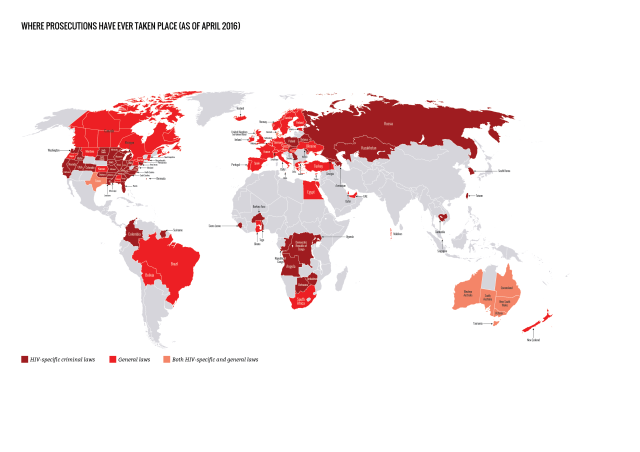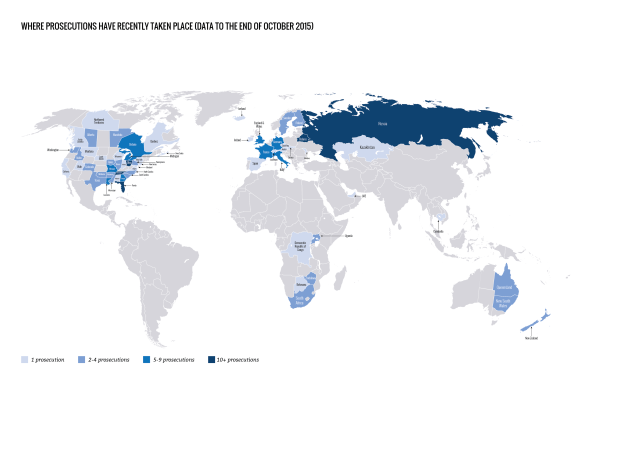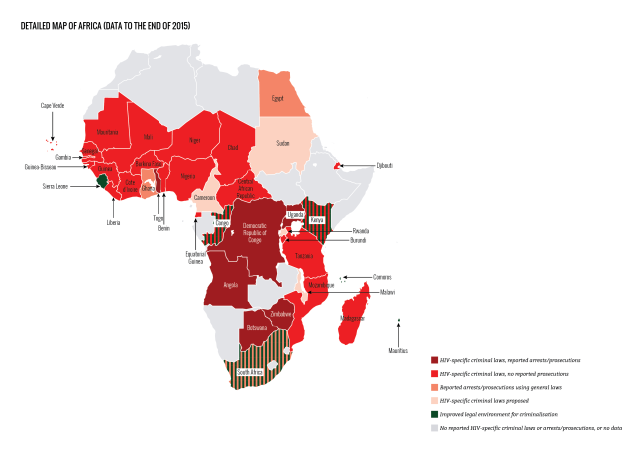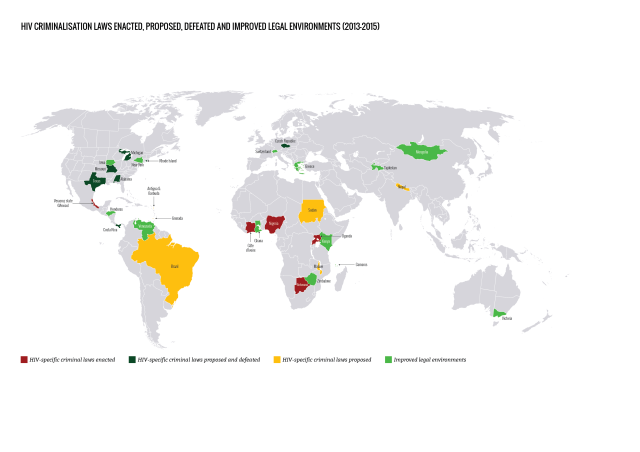This month, people living with HIV in Colorado scored a major legislative victory when the state legislature voted to pass Senate Bill (SB) 146. The bill repeals two HIV criminalization statutes, reforms another and standardizes and modernizes statutory language addressing sexually transmitted infections (STIs) including HIV. SB 146. It now awaits Governor John Hickenlooper’s signature.
Unlike many other states, Colorado has no law criminalizing the non-disclosure of HIV. However, if a person living with HIV is convicted of sexual assault, he or she can be given a sentence enhancement, meaning that a prison sentence can be increased up to three times the maximum sentence. The statute does not limit application of the enhancement to cases in which the assault led to HIV transmission; the fact that the assailant has HIV is enough to trigger it.
Colorado also has two statutes criminalizing sex workers living with HIV. One requires HIV testing for persons accused of sex work. If they test positive, prosecutors are allowed to access their health records to see whether they had previously been diagnosed with HIV. The second statute allows a felony charge ofprostitution with knowledge of being infected with AIDS.
These laws were rarely applied. “Even though the law had been on the books for years, there were very few prosecutions and even fewer convictions,” said Colorado Senator Pat Steadman, who sponsored SB 146, during his keynote address at the second HIV is Not a Crime conference last week in Huntsville, Alabama. In his research, he had found only a few cases where people had been charged with sexual assault with HIV; those had ended with plea bargains, meaning that the conviction and enhanced sentence had never been imposed.
Prostitution with knowledge of being infected with AIDS was used even less frequently. Steadman found only six cases in which people had been prosecuted under that statute. Those six include multiple prosecutions of one sex worker. The last prosecution resulted in a conviction and a lengthy prison sentence. But, Steadman pointed out, sex work is an example of a consensual, commercial transaction in which both parties are aware of the risk of STIs, and it shouldn’t be subject to criminalization. “It’s not really causing harm to others,” he noted.
Steadman credits the Colorado Mod Squad (“mod” is short for “modernization”), a de-criminalization taskforce led by the Positive Women’s Network-USA Colorado, with the impetus for the bill. The Mod Squad approached Senator Steadman asked if he’d consider sponsoring a bill repealing HIV criminalization. Steadman, who had a long history of working on HIV and public health issues, agreed. But, he told TheBody.com, “They did the initial research; they got the grassroots community support and brought in the medical experts.”
In March, Steadman introduced SB 146. The bill repeals the statutes on mandated testing for those arrested for sex work and the separate felony charge for prostitution with knowledge of being infected with HIV. While SB 146 does not eliminate the sentencing enhancement for sexual assault with HIV, it amends the law so that HIV transmission is a necessary trigger. “Now, with prophylaxis, the risk of transmission is greatly reduced, and so the likelihood of the law being used in the future is very low,” Steadman told TheBody.com.
Kari Hartel and Barb Cardell are both part of the Colorado Mod Squad. They noted that the impetus for the modernization bill came at the first HIV is Not a Crime conference in Grinnell, Iowa, in 2014. Iowa had just repealed its HIV criminalization law and, Hartel recalled, conference organizers challenged the audience, “Who’s next?”
“Barb’s hand shot up,” Hartel remembered.
Cardell said that when they set out to repeal the state’s criminalization statutes, they were often told, “That’s impossible.” But they persevered — and made sure that people living with HIV were involved to whatever extent they could be. “We’d ask them to read a part of the bill,” she remembered. “Or we’d ask them to read the whole bill.” Thirty-five people living with HIV participated in shaping the bill in some way. Some of the Mod Squad’s core members, such as John Tenorio and Deric Stowell, drove for hours — sometimes in snowstorms — from rural Colorado to Boulder to work on the bill.
At times, ensuring a wide range of participation made the process take longer. For instance, Hartel works with youth, but seeking their input involved more than simply asking them to read the bill and provide feedback. “A lot of the young people want the 30-second overview and how it will affect their lives,” she told TheBody.com.
When their questions couldn’t be answered, Mod Squad members brought their concerns to other meetings with policy advocates and public health officials, then brought the answers back to youth at a follow-up meeting. But all of the Mod Squad members agreed that meaningful participation of people living with HIV was crucial to the process. “This was a movement spearheaded by people with HIV,” said Hartel.
“The criminal law is a clumsy and ineffective tool for protecting public health,” became the sound bite as Steadman began garnering support for the bill. In doing so, he realized the extent of misinformation and ignorance about HIV transmission and criminalization laws. The campaign also provided him the opportunity to educate people, including those in law enforcement, about HIV transmission and its many myths. He downloaded a flier that says, “Spit doesn’t transmit,” and he passed copies out, primarily to police officers. Many, he recalled, were surprised to learn that saliva does not transmit HIV. “They pretended they knew, but they were also taken aback. They’d ask, ‘But what about dentists?'” Shaking his head, he reflected, “There hasn’t been a real effort for society to educate itself.”
Two months after the bill was introduced, members of the Mod Squad were present when the state legislature voted on the bill. As each section was approved, Reverend Tammy Garrett-Williams remembered exclaiming, “It’s passing, it’s passing!”
“It’s not passed yet,” Hartel recalled telling her. But the legislature passed the bill and it now awaits the governor’s signature. He has until June 10th to sign it into law. Steadman is confident that he will do so.
Nine members of the Colorado Mod Squad celebrated their victory at last week’s second HIV is Not a Crime conference. Conference organisers ordered two giant cakes to applaud their success. “It takes me back to Martin Luther King’s ‘I Have a Dream,'” reflected Reverend Tammy Garrett-Williams, another Mod Squad member. “He had a dream, but I have a mission.”
Originally published in The Body




